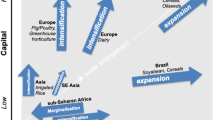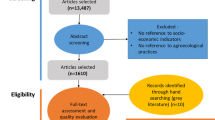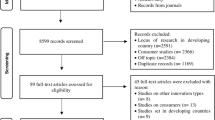Abstract
Much of the attention by social scientists to the rapidly growing organic agriculture sector focuses on the benefits it provides to consumers (in the form of pesticide-free foods) and to farmers (in the form of price premiums). By contrast, there has been little discussion or research about the implications of the boom in organic agriculture for farmworkers on organic farms. In this paper, we ask the question: From the perspective of organic farmers, does “certified organic” agriculture encompass a commitment to “sustainability” that prioritizes social goals? Specifically, we aim to broaden our understanding of the relationship between social sustainability and organic agriculture by drawing attention to issues affecting farmworkers, whose labor and contribution tends to elude most discussions of organic agriculture. We present findings from a survey of organic farmers in California about the possible incorporation of social standards into organic certification criteria. Our findings suggest that, at best, lukewarm support for social certification within organic agriculture exists among certified organic farmers in California. They also question expectations that organic agriculture necessarily fosters social or even economic sustainability for most of the farmers and farmworkers involved. However, we also find exceptions to the patterns evidenced in our survey. In-depth interviews with select organic farmers demonstrate that there are individuals whose practices are atypical and demonstrate that, under some circumstances, an organic production system can be at once environmentally, economically, and socially sustainable.
Similar content being viewed by others
Abbreviations
- ALRA:
-
Agricultural Labor Relations Act
- CCOF:
-
California Certified Organic Farmers
- IFOAM:
-
International Federation of Organic Agriculture Movements
- USDA:
-
United States Department of Agriculture
- WIC:
-
Women, Infants, and Children Program
References
Allen P., C. Sachs (1993). Sustainable agriculture in the United States: Engagements, silences, and possibilities for transformation. In: P. Allen (ed.), Food for the Future. John Wiley & Sons, Inc, New York, New York, pp. 139–167
Allen P., M. Kovach (2000). The capitalist composition of organic: The potential of markets in fulfilling the promise of organic agriculture. Agriculture and Human Values 17: 221–232
Allen P., D. Van Dusen, J. Lundy, S. Gliessman (1991). Integrating social, environmental, and economic issues in sustainable agriculture. American Journal of Alternative Agriculture 6(1): 34–39
Belasco W. (1989). Appetite for Change: How the Counterculture Took on the Food Industry, 1966–1988. Pantheon Books, New York, NY
Buck D., C. Getz, J. Guthman (1997). From farm to table: The organic vegetable commodity chain of northern California. Sociologia Ruralis 37: 3–20
Campbell H., R. Liepins (2001). Naming organics: Understanding organic standards in New Zealand as a discursive field. Sociologia Ruralis 41: 21–39
Carroll, D., R. M. Samardick, S. Bernard, S. Gabbard, and T.␣Hernandez (2005). Findings from the National Agricultural Workers Survey (NAWS) 2001–2002: A Demographic and Employment Profile of United States Farm Workers. Research Report No. 9. US Department of Labor
Cierpka T. (2002). A social agenda for organic agriculture? Ecology and Farming 30: 20–22
Conford P. (2001). The Origins of the Organic Movement. Floris Books, Edinburgh, Scotland
Coombes B., H. Campbell (1998). Dependent reproduction of alternatives modes of agriculture: Organic farming in New Zealand. Sociologia Ruralis 38: 127–145
Dmitri, C. and C. Greene (2002). Recent Growth Patterns in the US Organic Foods Market. USDA, Economic Research Service
DuPuis E. M. (2000). Not in my body: rBGH and the rise of organic milk. Agriculture and Human Values 17: 285–295
Feenstra G. (1997). What is Sustainable Agriculture? University of California, Sustainable Agriculture Research and Education Program, Davis, California
Fetter, T. R. and J. Caswell (2002). “Variation in organic standards prior to the national organic program.” American Journal of Alternative Agriculture 17(2): 55–74
Gershuny G., T. Forster (1992). Does organic mean socially responsible? Organic Farmer 3(1): 7–12
Gips, T. (1988). “What is a sustainable agriculture?” In P. Allen and D. V. Dusen (eds.), Global Perspectives on Agroecology and Sustainable Agricultural Systems: Proceedings of the 6th Annual IFOAM Conference. Santa Cruz, California
Guthman J. (2004a). Agrarian Dreams: The Paradox of Organic Farming in California. University of California Press, Berkeley, California
Guthman J. (2004b). The trouble with ‚organic lite’ in California: A rejoinder to the ‚conventionalisation’ debate. Sociologia Ruralis 44: 302–316
Guthman J. (1998). Regulating meaning, appropriating nature: The codification of California organic agriculture. Antipode 30: 135–154
IFOAM (International Federation of Organic Agriculture Movements) (2004). “What is organic agriculture?” Accessed on June 10, 2004 at http://www.ifoam.org
Inouye, J. and K. D. Warner (2001). “Plowing ahead: Working social concerns into the sustainable agriculture movement.” CA-SAWG White Paper. Santa Cruz, California: California Sustainable Agriculture Working Group
Kirschenmann F. (1993). ‚Organic’ may not be ‚sustainable’. Organic Farmer 4: 18
Klonsky K. (2003). Organic agricultural production in California In: J. Siebert (ed), California Agriculture: Dimensions and Issues. UC Giannini Foundation of Agricultural Economics, Berkeley, California, pp. 241–255
Levine, L. (2004). Farm Labor Shortages and Immigration Policy. The Library of Congress: Congressional Research Service
Martin P., B. Mason (2003). Hired workers on California farms In: J. Siebert (ed), California Agriculture: Dimensions and Issues. UC Giannini Foundation of Agricultural Economics, Berkeley, California, pp. 191–214
Mehta, K., S. Gabbard, V. Barrat, M. Lewis, D. Carroll, and R. Mines (2000). Findings from the National Agricultural Workers Survey (NAWS) 1997–1998. Office of Program Economics Research Report 8. Washington DC: US Department of Labor, Office of the Assistant Secretary for Policy
Mines, R. (2003). “Farmworker health in a binational context.” Challenges in Agricultural Health and Safety Conference, September 7–9. San Francisco, California
National Campaign for Sustainable Agriculture (2004). Our Vision. Accessed on November 10, 2004 at http://www.sustainableagriculture.net/vision.php
Oxfam America (2004). Like Machines in the Fields: Workers without Rights in American Agriculture. Accessed on April 11, 2006 at http://www.oxfamamerica.org/pdfs/labor_report_04.pdf
Palm Beach Post (2003). “Modern day slavery.” A Palm Peach Post Special Report. Accessed on April 11, 2006 at http://www.palmbeachpost.com/hp/content/moderndayslavery/index.html
Raynolds L. T. (2000). Re-embedding global agriculture: The international organic and fair trade movements. Agriculture and Human Values 17: 297–309
Reeves M., A. Katten, M. Guzmán (2002). Fields of Poison: California Farmworkers and Pesticides. Californians for Pesticide Reform, San Francisco, California
Rosenberg, H. R., S. M. Gabbard, E. Alderete, and R. Mines (1993). California Findings from the National Agricultural Workers Survey. US Department of Labor
Schell G. (2002). Farmworker exceptionalism under the law: How the legal system contributes to farmworker poverty and powerlessness In: J. Thomson, D. Charles, M. F. Wiggins (eds), The Human Cost of Food: Farmworkers’ Lives, Labor, and Advocacy. University of Texas Press, Austin, Texas, pp. 139–166
US Commission on Agricultural Workers (1992). Report of the Commission on Agricultural Workers. US Commission on Agricultural Workers, Washington, DC
USDA (2000). National organic program final rule. Federal Register 65: 80547–80596
Villarejo D., S. L. Baron (1999). The occupational status of hired farm workers. Occupational Medicine: State of the Art Reviews. Special Populations 14: 613–635
Villarejo D., D. Lighthall, D. Williams, A. Souter, R. Mines, B. Bade, S. Samuels, S. A. McCurdy (2000). Suffering in Silence: A Report on the Health of California’s Agricultural Workers. California Institute for Rural Studies, Davis, California
Acknowledgments
We are grateful for funding support for this research from the University of California Institute for Labor and Employment and for institutional support from the University of California Sustainable Agriculture Research and Education Program.
Author information
Authors and Affiliations
Corresponding author
Additional information
Aimee Shreck is a sociologist and the Research Specialist for the California Faculty Association. Previously, as a postdoctoral researcher with the University of California, Berkeley and the Sustainable Agriculture Research and Education Program, her research focused on social justice, sustainable agriculture, and fair trade.
Christy Getz is an Assistant Cooperative Extension Specialist in UC Berkeley’s Department of Environmental Science, Policy, and Management (ESPM). Her research and extension work links natural resource-dependent people, activities, enterprises, and organizations in California with teaching and research programs in the College of Natural Resources. Her program is focused on community and economic development in natural resource-dependent communities, social justice and labor in natural resource-dependent industries, and sustainable food systems and community food security. She received her PhD in sociology from the University of California, Berkeley. Currently, she is Co-Chair of UC Cooperative Extension’s Building Food Security Workgroup.
Gail Feenstra is the food systems analyst at the University of California Sustainable Agriculture Research and Education Program (SAREP). She coordinates SAREP’s Food Systems Program, which encourages sustainable community development that links farmers, consumers, and communities. Her research and education efforts include: direct marketing, farm-to-school programs, urban agriculture, food security, food policy, and food system assessments. Feenstra’s professional training is in nutrition with a doctorate in nutrition education from Teachers␣College, Columbia University. She is past president of the Agriculture, Food, and Human Values Society and associate editor of Renewable Agriculture and Food Systems (formerly American Journal of Alternative Agriculture). In her spare time she loves to garden and cook using foods from her local foodshed.
Rights and permissions
About this article
Cite this article
Shreck, A., Getz, C. & Feenstra, G. Social sustainability, farm labor, and organic agriculture: Findings from an exploratory analysis. Agric Hum Values 23, 439–449 (2006). https://doi.org/10.1007/s10460-006-9016-2
Accepted:
Published:
Issue Date:
DOI: https://doi.org/10.1007/s10460-006-9016-2




